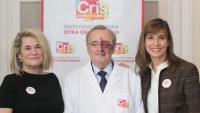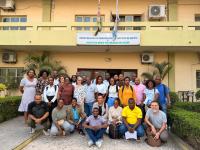MERCOSUR countries create a negotiating mechanism to procure high-cost medicines, with PAHO support

The ministers of health of MERCOSUR and Associate States completed initial negotiations with a number of pharmaceutical companies on 13 November in Asunción, Paraguay, that will lead to the joint procurement of high-cost medicines, with the support of the Pan American Health Organization/World Health Organization (PAHO/WHO).
In an initial round of negotiations, the ministers of health received an offer from the pharmaceutical company Gilead for an antiviral medicine against hepatitis C at the lowest price available in the region. Agreement was also reached on using the PAHO Strategic Fund for pooled procurement of an antiretroviral medicine to treat HIV/AIDS.
In the first round of negotiations, the health ministers agreed to purchase darunavir––an antiretroviral medicine used in the treatment of HIV/AIDS––through the PAHO Strategic Fund, a mechanism that promotes access to strategic public health supplies in the Americas. The antiretroviral will be purchased at US$1.27 per tablet, significantly less than the lowest price previously available to any of these countries (US$2.98), resulting in cost savings of some US$20 million for participating countries. This price will be made available to any PAHO Member State that participates in the Strategic Fund.
The health authorities also negotiated the prices for direct-acting antivirals used in the treatment of hepatitis C. Participating countries achieved significant reductions in the price of these medicines. In the case of sofosbuvir, produced by Gilead, countries received an offer of the lowest current price in the region, paid by Brazil (US$81.85 per tablet). The ministries committed to evaluate additional offers received with a view to achieving consensus on the best options for procurement to treat hepatitis C.
"For countries, the outcome of this meeting is very positive, as it will facilitate access to the key essential medicines they need," said Analía Porrás, head of PAHO/WHO's Medicines and Health Technologies Unit, who participated in the meeting. "It also launches a new and innovative platform for cooperation on price negotiations and procurement between PAHO Member States and the Strategic Fund."
PAHO supported this price negotiation as an observer, providing technical assistance to the ministries of health, as well as through the structure of the PAHO Strategic Fund, a mechanism established by PAHO to support pooled procurement of medicines that meet international quality, safety and efficacy norms.
In a second round of negotiations, the MERCOSUR countries and Associate States will meet to negotiate the purchase of other high-cost medicines, including cancer drugs.
The high cost of many medicines that are essential to save lives and reduce illness poses a growing challenge for national health systems, as these products consume an ever-increasing percentage of national health budgets.
In September of this year, PAHO brought 22 Member States together in Santiago, Chile, to discuss the problem of access to high-cost medicines. At that meeting, countries reached consensus on the need to obtain affordable products through collective negotiation mechanisms, comprehensive pricing policies, transparent procurement processes, and facilitating greater competition.



